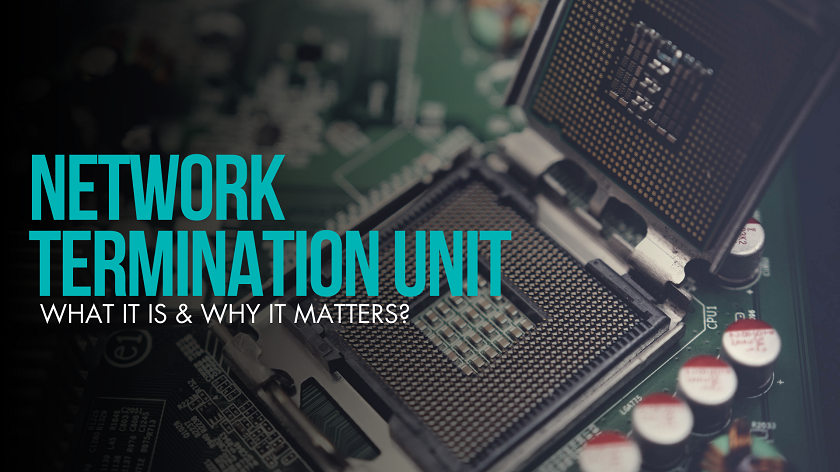If you ever wondered what exactly a Network Termination Unit (NTU) is, you’re not alone. This is one of those techy terms that seems more sophisticated than it actually is. Don’t worry — today we will break everything down in plain, straightforward english. We will also talk about why this small but potent device important, especially if you work with internet networks or commercial communication systems.
So, What Is a Network Termination Unit (NTU)?
Let’s start with the basics. A Network Termination Unit, or NTU for short, is a device that links your internal network to your internet service provider (ISP) or telecom firm. Think of it like a middle-man — it’s the bridge that enables data go from the outside world into your business or home network.
Without the NTU, your internet line or telecom circuit would be relatively useless because there would be nothing to regulate or control the signal at your end. The NTU makes that the network service provider’s connection “talks” properly with your local equipment like routers, modems, or switches.
To make it more simple, the NTU is like a translator. Your ISP speaks one language, and your internal network speaks another. The NTU helps them comprehend each other.
How Does It Work?
An NTU normally located directly where the external service from your supplier enters your building. The incoming fiber optic or copper cable plugs into the NTU. Then, the NTU provides the signal to your internal equipment so your PCs, phones, or other devices may get online or make calls.
In technical words, the NTU manages the conversion and termination of signals. This means it takes the signal that arrives across a wide area network (WAN) like Ethernet, fiber, or DSL, and then it “terminates” it and sends it onto your local area network (LAN).
It can also do other vital things, like:
- Signal conditioning (making sure the signal is clean and reliable)
- Error checking (so data is supplied without mistakes)
- Traffic management (making sure info flows smoothly and fast)
Types of NTUs
Not all NTUs are made equal. There are many types of NTUs depending on the kind of service you have:
- Ethernet NTU — If you have fiber-optic internet, you probably use an Ethernet NTU.
- ISDN NTU — Used largely in older phone and data services.
- DSL NTU – This works for DSL internet services.
- T1/E1 NTU – Common in older business telecom systems that use copper lines.
Modern NTUs frequently come as part of fiber services or leased line configurations in companies or even residences where there’s demand for quick and dependable connections.
Why Does It Matter?
Alright, now you might be wondering, “Why should I care about some little box sitting in my server room or closet?” Well, here’s why the NTU is actually a major deal:
1. Reliability
An NTU is designed to keep your connection steady and working smoothly. If the NTU isn’t working well, your internet or communication system can go down. That’s especially painful for organizations where downtime means losing money and productivity.
2. Speed
Without an NTU, your network wouldn’t be able to manage high-speed connections properly. Modern NTUs assist to make sure data goes fast, which is highly crucial in today’s environment where everyone wants speedy downloads and smooth video conversations.
3. Diagnostics & Maintenance
NTUs generally come with built-in diagnostic tools. This means if something goes wrong, your provider can occasionally check the NTU remotely to identify where the problem is. It helps in addressing difficulties faster because they can detect if the problem is with the provider’s network or inside your building.
4. Security
Some NTUs provide rudimentary security measures. They can stop some forms of undesirable traffic from getting into your network. It’s not the same as having a firewall, but it’s still another layer of security.
NTU vs. Modem – What’s the Difference?
People sometimes confuse NTUs with modems. Both connect to your ISP, but they are not the same.
- A modem turns digital data into a signal that goes across phone lines or coaxial cables and then back into digital data.
- An NTU commonly links fiber or high-speed leased lines directly to your internal network.
In certain circumstances, the NTU and modem are incorporated into one device, but in business environments, they are generally separate.
When Do You Need an NTU?
If you have a regular home internet connection, you might not see the NTU because your ISP probably mixes it with your modem/router. But if you run a business or have high-end internet services like fiber leased lines or dedicated circuits, you will undoubtedly have an NTU.
In these circumstances, you need an NTU to:
- Handle the speed and bandwidth
- Manage the professional network infrastructure
- Ensure service-level agreements (SLAs) from the ISP are met
Can I Fix or Replace an NTU?
NTUs are normally given and managed by your ISP or telecom carrier. They are responsible for fixing or replacing it if it breaks. It’s not suggested for users to try and open or fix NTUs themselves. These devices are designed for long-term usage and can endure for years, but like anything electronic, they can fail.
If you see indicators like no connection, flashing error lights, or strange noises (yes, occasionally gadgets hum or buzz weirdly), call your ISP.
The Bottom Line
So now you know – the NTU might not be the flashiest gear in your office, but it is vital for ensuring sure your network plays along with the outside world. Without it, you wouldn’t be able to access the fast internet or reliable phone services you rely on every day.
Next time you pass that little box on the wall with a bunch of cables sticking out, give it a little nod. It’s doing more effort than you think!

